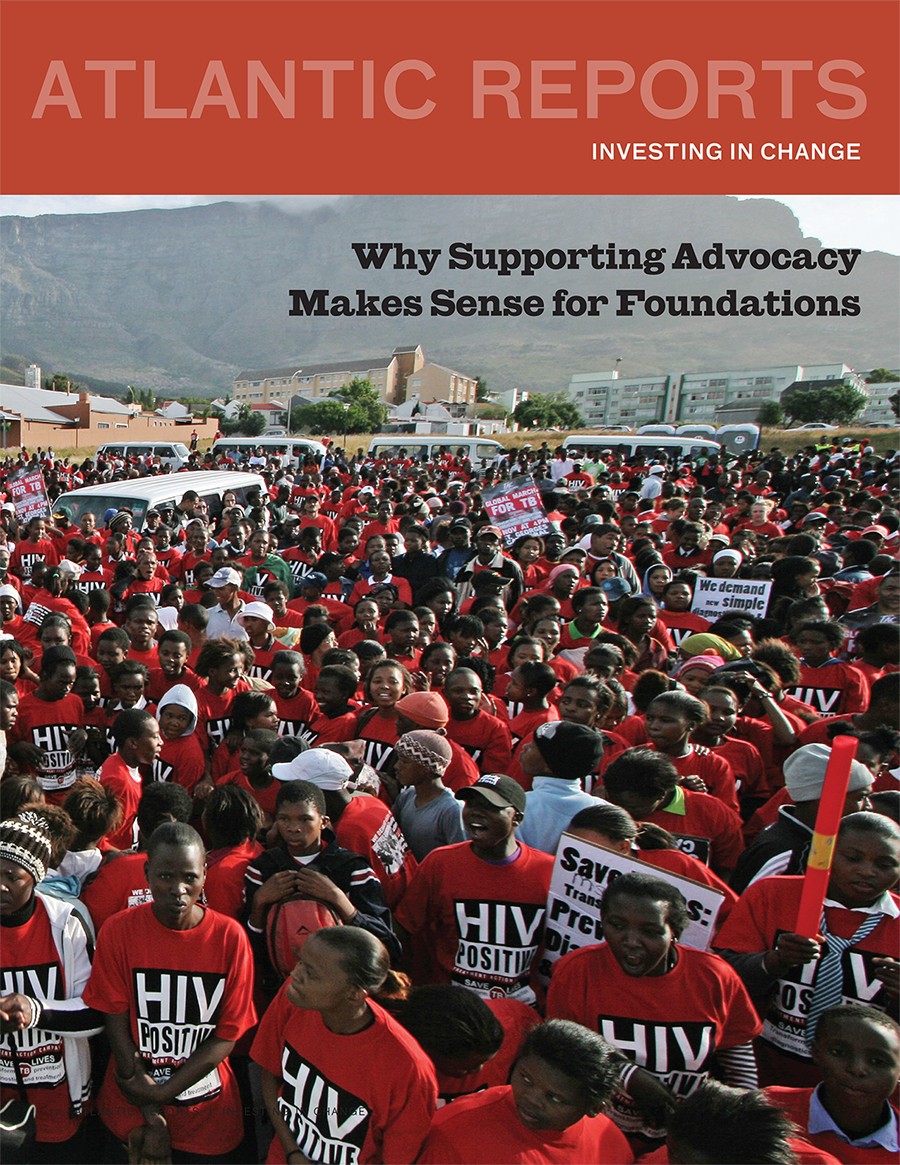Investing in Change: Why Supporting Advocacy Makes Sense for Foundations
20 pages, 2008. Atlantic Philanthropies. http://www.atlanticphilanthropies.org
Download:
![]() Why Supporting Advocacy Makes Sense for Foundations (3 Mb)
Why Supporting Advocacy Makes Sense for Foundations (3 Mb)
This publication explores the experiences of a growing number of funders around the world that are committed to supporting advocacy as a strategy to advance social change. We are starting with this topic because funding advocacy too often is the philanthropic road not taken, yet it is a road most likely to lead to the kind of lasting change that philanthropy has long sought through other kinds of grants.
It provides information and lessons about the wide spectrum of advocacy activities funders can support, including:
Research and Dissemination: Credible research is an excellent tool for raising the profile of a problem and explaining the ongoing impact of a policy or condition on individuals, communities and nations. Many foundations support this frequently.
Raising Awareness: Increasing public consciousness is important to advance action on an issue, because important constituencies are often not fully aware of the problem or its dimensions. These efforts can take many forms, including media placement, advertising, speeches to influential audiences, legislative testimony, regulatory boards and commissions. In The Republic of Ireland, the Forum on Migration and Communications (FOMACS) has a three-year media programme to increase awareness of immigration and integration issues.
Community Organising: Supporting communities that organise on their own behalf is a critical component of funding advocacy, enabling those most affected to voice their concerns and promote their interests with government officials and powerful private entities. The Treatment Action Campaign in South Africa, fighting for HIV treatment and the rights of people living with HIV/AIDS, is an example of the importance of this kind of work.
Grassroots Mobilisation: Demonstrating broad-based public support for policy change is crucial to success. Mobilising membership organisations, coalitions and others to visit elected officials and their staffs – or to generate greater public awareness of an issue – can be highly powerful in bringing about policy change. In The Republic of Ireland, the Irish Senior Citizens Parliament organised the unprecedented moblisation of up to 20,000 older people from all over Ireland to protest outside the Irish Parliament and they successfully stopped the proposed withdrawal of government medical cards for 95 per cent of people over age 70.
Building Capacity: Supporting staff, infrastructure and membership development of advocacy organisations is another important way to enable long-term change, and has been a key tool of our U.S. human rights effort to challenge the former Bush Administration’s incursions on civil liberties.
Policy Development: Developing policy options can aid change by providing advocates, legislators and others with credible suggestions for solving problems and supporters with a goal to rally around. Atlantic’s grant to the Center for Law and Social Policy is aimed at strengthening the center’s ability to influence and inform U.S. federal and state policy affecting disadvantaged children and their families.
Lobbying: Some funders may develop, refine or amend legislative language or support proposed legislation or ballot initiatives at the local, state or federal level. Countries regulate lobbying differently, so conferring with legal counsel is the best approach. Good examples are Atlantic’s work to advance comprehensive immigration and health-care reforms in the U.S.
Litigation: Taking legal action to achieve desired changes or fight undesired policies and practices is a tool that advocates have long used effectively. This is how Atlantic grantees brought about same-sex marriage in South Africa and an end to the juvenile death penalty in the United States.
All of these activities, ranging from research to lobbying, can contribute to lasting change. As a funder committed to solving some of the greatest challenges before us today, Atlantic is striving to support these approaches even more frequently and ever more effectively while encouraging others to do so as well.

